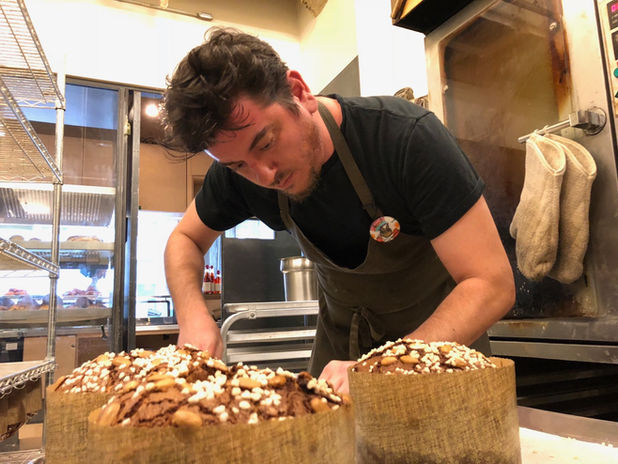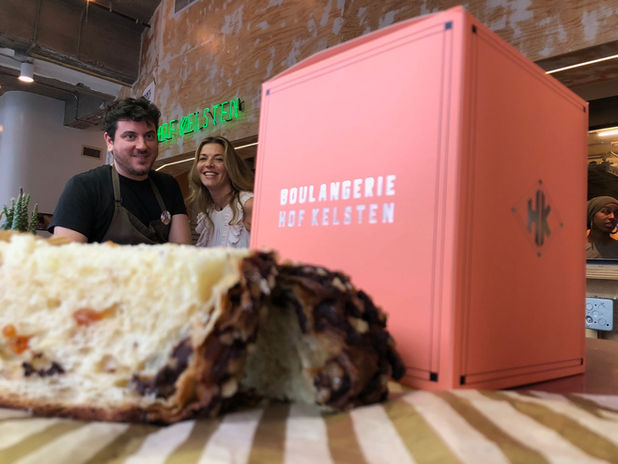
This is the ninth instalment in the series Beyond the Plate, looking at the motivations and passions of local chefs.
Hof Kelsten's panettone is a hit for the holidays
December 12, 2018
“And, when you want something, all the universe conspires in helping you to achieve it.”
— The Alchemist
That quote from Paulo Coelho’s novel describes the journey of Jeffrey Finkelstein, founder of Hof Kelsten bakery and renowned panettone purveyor. Like Coelho’s young shepherd, whose journey turns into a fantastical adventure in which he pursues his wildest dreams, Finkelstein learned lessons throughout his travels. Schooled by culinary greats, he returned home with the knowledge and skill to develop a creation that would define his career.
The youngest of three children in a Jewish home, Finkelstein attended Jewish People’s and Peretz Schools, then St. George’s high school and Dawson College. Nothing out of the ordinary, until he reached his late teens.
“I went to help my dad’s business out in Asia when I was 19,” Finkelstein says. “I lived in Hong Kong and worked in China. It was a Christmas lighting and decoration business.”
With his dad fighting a losing battle against cancer, the business was suddenly in need of a new leader. “That was the start of my business experience.”
At 20, Finkelstein returned to Montreal and enrolled in Concordia’s anthropology department. Meanwhile, he took his first kitchen job, at the now-closed Monkland outpost of Asian noodle chain Zyng.
When he asked what was needed of him for the job, he recalls, the only requirement was: “Bring black pants … you start tomorrow!”
“I got trained in the kitchen there, and throughout university I was cooking part time at Zyng and at Le Petit Italien (on Bernard Ave.).”
Around his final semester at Concordia, Finkelstein says, he decided he wanted to concentrate more on cooking. Just a few months shy of graduation, he dropped out of university and never looked back.
“I took a little bit of an inspiration trip around the world,” says Finkelstein, who began and ended his pilgrimage in Europe. “I had to really make sure this was what I wanted to do. I cooked a little in England and ended my trip saying I wanted to go to culinary school.”
He was accepted into the International Culinary Center in New York City. “I pretty much needed to muscle my way in there,” he recalls, “because there’s a waiting list for a year, and I told them I was super focused and serious. They let me come, like eight days later, and I just drove down to New York with literally a small bag and a pillow and crashed on my friend’s floor.”
The school offered a six-month intensive option, equivalent to a two-year education. “It’s all kitchen time. No classes.”
Near the end of the curriculum, an unpaid stage was required to graduate. It was the era when chefs like Thomas Keller of Per Se and Jean-Georges Vongerichten of the eponymous Jean-Georges were earning Michelin stars and becoming legends in the New York food world.
As Gordon Ramsay said: “If you want to become a great chef, you have to work with great chefs.” And that’s what Finkelstein aspired to do.
© Photos by Ezra Soiferman
“I did my exiting stage at Per Se, which was just opening and is a three-star Michelin restaurant. They came to our school and interviewed. It was a big, big project. I even gave up working for Daniel Boulud to go stage there. … On the advice of my school: ‘If you have an opportunity to work for Thomas Keller, you go do it!’ ”
Finkelstein honed his skills under Keller’s tutelage during a three-month internship, but with no paycheque, he was burning through his savings. After finishing the prestigious stage, he returned to Montreal, moving back in with his mom at 25. With his ambition and new credentials, he secured a job at revered chef Normand Laprise’s restaurant Toqué!
“I had written Normand Laprise. I literally guessed his email address and sent him my CV. I told him I was finishing at Per Se and wanted to now come work for the best.”
After a year at Toqué!, Finkelstein went to stage for a month at the French Laundry, a sister restaurant of Per Se, in Napa Valley. From there, he longed for even more travel. With an old-school approach, he sent 30 CVs to 30 culinary greats. Much to his excitement, London answered.
“I sent my CVs by post, as most restaurants at this time did not have a website, and the only people who wrote back were guys from England. One of them being Gordon Ramsay.” He also received replies from Michelin-star chef Tom Aikens, and from Claude Bosi, of two-star Michelin restaurant Hibiscus, “who hired me over the phone!”
After a year and a half in England, it was time for another change. Finkelstein worked with award-winning pastry chef Oriol Balaguer at elBulli in Catalonia, where he learned the art of pâtisserie and the secret to making a Christmas panettone. He was also given a stash of sourdough starter from Balaguer, which later proved to be the ultimate treasure from his travels.
From there, it was off to Copenhagen. “(As my) last attempt to work at the best places in the world,” Finkelstein says, “I went to (the two-star Michelin restaurant) Noma.”
And that’s when Finkelstein had an epiphany. “The head chef and owner was my age. I realized it was time: I needed to do my own thing.”
After four years in Europe, piecing together all he learned from cooking and baking masters, at age 30 Finkelstein decided once again to move back to Montreal.
“I needed to take a break and have a moment of reflection,” he says. “There was an economic recession, and a lot of fine-dining restaurants were going under. I learned from Oriol there could be work/life balance.”
Finkelstein intended to take three months off, but became restless after three weeks. Breaking out the sourdough starter he brought back from Spain, he began tinkering with a recipe that would become Hof Kelsten’s now-famous panettone.
“I always had a passion for bread,” he says. “The beginning of Hof Kelsten bakery was in my mom’s kitchen. I took over her fridge — it was filled with dough. Every night I would shape, mould, leave overnight, then bake every morning.”
Within three years of his return, Finkelstein opened Hof Kelsten, realizing his dream of running an artisanal Jewish- and French-inspired pastry and bread shop, with a thriving lunch and brunch counter to boot.
“I found something that I could be obsessive-compulsive over: a reasonably priced product in a recession that I could put my three-star Michelin experiences into.”
The holiday season is especially busy at Hof Kelsten, which has emerged as the unlikely prime provider of Christmas panettone in Montreal. Lineups form in the St-Laurent Blvd. bakery throughout December, and as Finkelstein excitedly tells me, “We’ve had to build an online shop to handle the (volume) of orders!”
For our Beyond the Plate food adventure, it was important for Finkelstein to show support for a local grain farmer. “We use as much organic stuff as we can,” he proudly informed me on our drive out to Les Cèdres, where we visited Loïc Dewavrin at his family-run certified organic farm and mill Le Moulin des Cèdres.
Turning that grain into Hof Kelsten’s mouth-watering menu, Finkelstein has become an alchemist in his own right. Having pursued his dreams with a thirst for learning, he says: “It’s a real challenging life to be a chef, but the hope was there!”
This essay originally appeared in the Montreal Gazette on December 12, 2018





